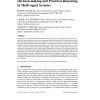Free Online Productivity Tools
i2Speak
i2Symbol
i2OCR
iTex2Img
iWeb2Print
iWeb2Shot
i2Type
iPdf2Split
iPdf2Merge
i2Bopomofo
i2Arabic
i2Style
i2Image
i2PDF
iLatex2Rtf
Sci2ools
134
Voted
LOGCOM
2002
2002
Formalizing Collaborative Decision-making and Practical Reasoning in Multi-agent Systems
paper, we present an abstract formal model of decision-making in a social setting that covers all aspects of the process, from recognition of a potential for cooperation through to joint decision. In a multi-agent environment, where self-motivated autonomous agents try to pursue their own goals, a joint decision cannot be taken for granted. In order to decide effectively, agents need the ability to (a) represent and maintain a model of their own mental attitudes, (b) reason about other agents' mental attitudes, and (c) influence other agents' mental states. Social mental shaping is advocated as a general mechanism for attempting to have an impact on agents' mental states in order to increase their cooperativeness towards a joint decision. Our approach is to specify a novel, high-level architecture for collaborative decision-making in which the mentalistic notions of belief, desire, goal, intention, preference and commitment play a central role in guiding the individual ...
Related Content
| Added | 22 Dec 2010 |
| Updated | 22 Dec 2010 |
| Type | Journal |
| Year | 2002 |
| Where | LOGCOM |
| Authors | Pietro Panzarasa, Nicholas R. Jennings, Timothy J. Norman |
Comments (0)

